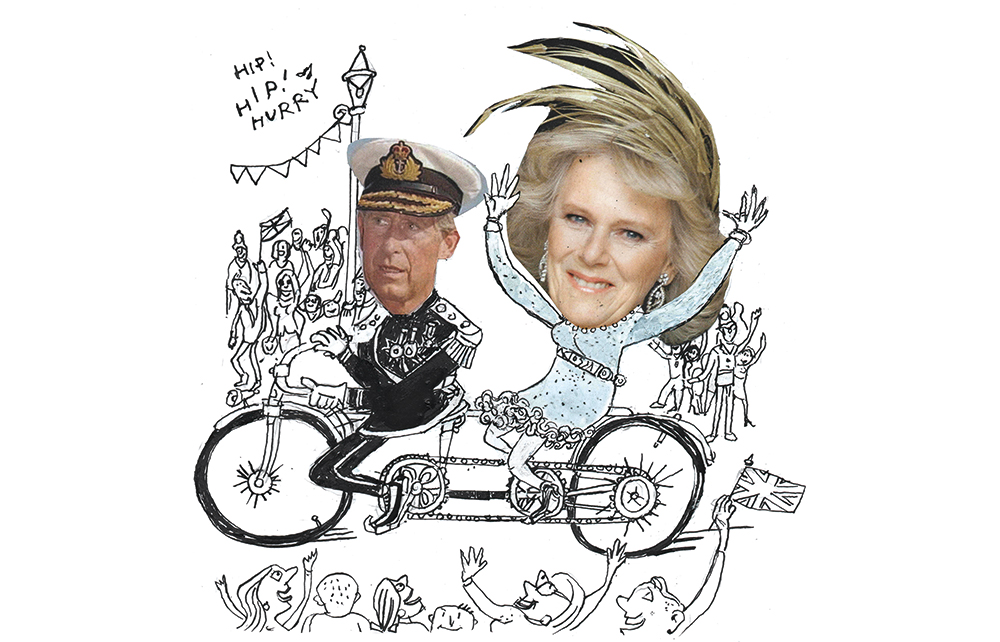Travelling to Ukraine on the President’s train is the most secure route into Kyiv. This is my fourth visit to the country since the invasion. Previously I accompanied Boris Johnson and Rishi Sunak. This time I am with Tim Barrow, our National Security Adviser. The continuity of access reflects the extraordinary trust between Britain and Ukraine. The train is punctual and with an aura of seasoned grandeur. The enforced lack of phones combined with a steady rhythm for ten hours aids reflection. I think back to travelling to Moscow with Ben Wallace before the invasion and a meeting with my Russian opposite, General Gerasimov. At the time we still hoped war could be averted. This conflict has been a disaster for the Kremlin. Putin thought he could take Kyiv and the cities of Ukraine in a matter of days, but now faces a horrific war of attrition. Four out of five of Russia’s recent offensives have failed and the fifth, Bakhmut, has cost Moscow 30,000 dead and wounded. Russia is weaker and more isolated. Nato is stronger and more united. Ukraine stands even more defiant.
We arrive in Kyiv and head to see Volodymyr Zelensky. The curtains are pulled and sandbags are everywhere but there is no sense of crisis, just steady determination. President Zelensky looks fit and healthy, as does my counterpart, General Zaluzhnyi. I always give him a bottle of Glenmorangie whisky. His eyes also light up when told we have sourced more weapons. The survival of his country is at stake. The pressure is immense, but it is carried well, and I have enormous respect for his leadership. I emerge from a day of briefings confident in Ukraine’s ability to prevail, providing the international community stays strong.
I am reunited with my phone and am confronted by a backlog of messages. The Vice Chief, General Gwyn Jenkins, updates me on the evacuation of British citizens from Sudan. The ceasefire is fragile, communications are difficult, the logistical challenge immense and evacuees are flowing from tens to hundreds to potentially thousands. Early decisions to deploy troops, marines and transport aircraft to Cyprus are paying dividends. It meant options for the Prime Minister. I phone my Saudi counterpart to coordinate. His reply is resoundingly supportive, as is the US, France, Egypt, Germany and India. This is the power of networks. As ever, the people on the ground are magnificent: clear, committed, resilient, action-oriented; ultimately, problem solvers. We need to capture the same sense of urgency and pace and apply it to how we do things at home to become even more effective.
The Palace has appointed me Lord High Constable of England for the coronation. If that were not honour enough, the Duke of Wellington has generously offered to lend me a baton used by his ancestor: would I like the one used for Queen Victoria’s coronation or for George IV’s? It’s all getting a bit surreal, but any notions of grandeur are quickly dispelled by Sunday drill practice at a Hampshire airfield. The army’s Garrison Sergeant Major is not a man who suffers fools gladly, admirals, generals and air marshals included. The chiefs are put through our paces alongside thousands of sailors, soldiers and aviators, some of them only in their teens. Marching has never been my strong point and I’ve become a little rusty in the 37 years since I was originally on the parade ground. That evening I find myself practising my step as I get ready for bed.
The Lord High Constable dates from the 12th century, but my day job is focused on the technology of the 21st. One of the big lessons of Ukraine is the importance of nuclear deterrence. We should be proud of the UK’s contribution to Nato’s defensive umbrella. It’s not easy: our submarines are perhaps the most complex machines on the planet. I spend a lot of time discussing the importance of skills and the need for thousands more nuclear apprentices. Our whole nuclear enterprise needs to be elevated to a national endeavour.
The past 18 months have seen a shift from a world that was competitive to one that is contested and volatile. The Budget in March put the country on course to spend 2.5 per cent of GDP on defence. The army alone will receive £130 billion over the next decade. I’ve challenged the Ministry of Defence to double our output using the resources we currently have. It’s not just about money and people. It’s as much about reform. Ukraine has taught us that we need to embrace technology even more strongly, especially long-range missiles and greater numbers of drones.
The final coronation rehearsal takes place overnight. Whitehall is deserted as we parade down the Mall under the cover of darkness. Military pageantry symbolises our identity and self-confidence as a nation, and the style and assurance are itself a form of power. But the pomp and splendour need to be seen alongside everything else the armed forces are doing: Sudan, Ukraine, our Nato roles, our burgeoning defence partnerships with Australia, India and Japan. I’m proud of our people for all they do for all of us.
I’m looking forward to spending Sunday night at the coronation concert. My marching has improved but I’m less confident about my dad-dancing. Either way, my children will keep me in check.
Admiral Sir Tony Radakin is Chief of the Defence Staff.
Join The Spectator's Fraser Nelson, Katy Balls and guest Camilla Tominey from the Daily Telegraph for a special edition of Coffee House Live covering what kind of monarch Charles III will be, and whether the coronation will distract voters from the Tories’ predicted heavy losses in the local elections. 10 May from 7pm. Book your tickets today: spectator.co.uk/coronation






Comments